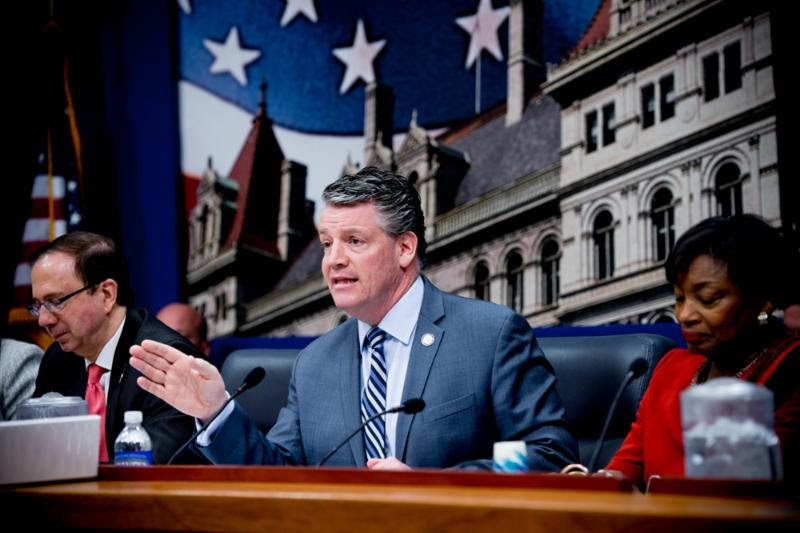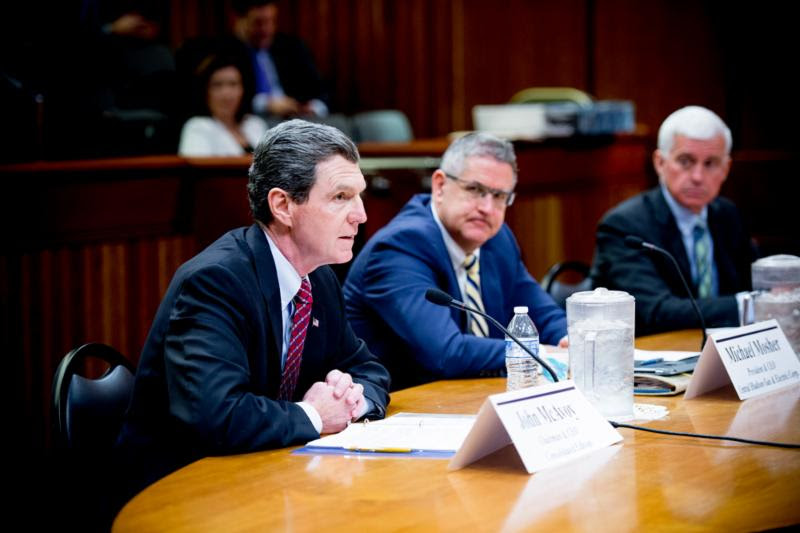
Senator Murphy Chairs Hearing That Shines Light on Utilities Lack of Readiness for March Storms
March 28, 2018

Albany, NY - When two Nor'easters tore through the Hudson Valley earlier this month, more than 160,000 residents were left shivering in the dark watching their food spoil. Many were trapped in their neighborhoods by arcing live wires, splintered utility poles or fallen trees for up to ten days. The nagging question long after the lights came back on was why did it take local utility companies so long to respond? That question and many others were addressed on March 27 when Senator Terrence Murphy, in his capacity as Chairman of the New York State Senate's Committee on Investigations and Government Operations, led a preparedness and response hearing at the Capitol Building in Albany. Senator Joseph Griffo, Chairman of the New York State Senate Committee on Energy, and Senator Sue Serino, Chairwoman of the New York State Senate Committee on Aging, co-hosted the hearing.
"The definition of insanity is doing the same thing over and over again and expecting different results," said Senator Murphy. "Despite investigations following hurricanes Lee, Irene and Sandy, despite the many ice and wind storms over the years, three major utility companies left thousands of their customers in the dark, told them their lights were coming on, and then didn't deliver. This is unacceptable. I was out on the road with Town Supervisors and repair crews, taking water and emergency generators to people who were desperate for information as to when the power would be restored. The lines of communication between the utility company's emergency centers and the crews out in the field doing the repair work broke down. We can't beat Mother Nature, but we owe it to the people we serve to have a practical, effective emergency plan we can put into effect when outages do occur."

"This is an opportunity for us to get together to assess the damage from the storms and the restoration process, particularly in the Hudson Valley," said Senator Griffo. "I am appreciative that the CEO's from Con Edison, NYSEG and Central Hudson are here so we can hear first-hand from the utilities as well as the PSA and the local elected officials who were on the ground facing these challenges when the storms hit and went the extra mile to serve their communities. What we want to do is investigate what we can learn from these experiences, how and what can be done, particularly from an accountability perspective."
Senator Serino said, "I would like to relay a story that I think will have some impact as we move forward and you hear everyone's testimony... I had a 93-year-old constituent come into the office following the storm. She lived alone and thought she could weather the storm. She stayed in her home for two days and two nights. She was rushed to the hospital because she couldn't get her medication and was thought to be having a stroke. She was discharged from the hospital but due to the cold and lack of power, she couldn't go back home. She was then placed in a shelter. They fed her and kept her warm but she had to sleep on a hard military cot - not an easy task for a 93-year-old woman. She said she slept with her pocketbook around her neck and her cane on her chest. Red Cross got her medication, but she didn't get to shower or change her clothes for eight days. The lack of communication led to further complications. She was told multiple times that her power had been restored when it was still out. I chair the Senate Committee on Aging, and when I heard this story, I was outraged. Our residents deserve better. They deserve answers, and that's why we're here today."
Senator Thomas Croci stated, "New York State government from the highest level must be aligned to be assured we are focusing PSC and DPS and the utility companies to maintain and improve the resiliency of our electrical grid. Whether it's the transmission lines that bring power to our homes, our the ability to generate reliable electrical power during catastrophic weather events, New York State government must keep politics out of ensuring our residents are safe and have uninterrupted electric."
"I'm in a district where 95% of our local residents were out of power for an extended period of time. The fact that an 11-year-old boy lost his life speaks to the severity of the storm. I realize it was a catastrophic storm; that doesn't mean this standard is acceptable," said Assemblyman Kevin Byrne. "I'm interested in hearing more about the emergency response plans from these utility companies and how we can improve communication between rate payers, elected officials, and the utility companies. The communication system broke down completely but I know it can be improved."

Among other members of the Senate and Assembly in attendance were Senator Andrea Stewart-Cousins, Senator Brad Hoylman, Senator Thomas Mara, and Assemblyman David Buchwald.
Somers and North Salem were two of the towns hit hardest by the storms. Somers Town Supervisor Rick Morrissey and North Salem Town Supervisor Warren Lucas related the horrific conditions residents were forced to face when Con Edison and NYSEG were slow to respond.
"NYSEG knew a storm was coming, yet they were unprepared; close to 90% of our residents were left without power. Some neighborhoods were trapped for days behind live wires," said Somers Town Supervisor Rick Morrissey. "Our fire department responded to a call and had to wait for almost an hour, watching a house burn because they had to wait for NYSEG to make the live wires safe. On another fire call, the SFD commandeered a NYSEG crew as it was on route to another site. The NYSEG crew was not released until they had cut power to the house on fire so firefighters could put out the flames. Town Offices fielded more than a thousand calls related to power outages that should have been handled by NYSEG. Even when work crews were dispatched, some waited in parking lots for hours before they received their work orders. The system is broken but not impossible fix. We need to devise a more timely and efficient program for the maintenance of our trees and upgrade our electrical infrastructure."

North Salem Supervisor Warren Lucas said, "Trees are by far the biggest cause of failures in the system. Our tree cover has substantially increased over the last 50 years. The town used to be field after open field of dairy farms. The trees that have grown in those fields are too close together and many are unhealthy due to the density and the invasive species that plague them. NYSEG is behind on their maintenance program in our Town.
"In 2014 Asplundh asked out the contract they had committed to because of the number of trees that had to be taken down. The right of way that they and most utility companies have is also insufficient because as we see in recent storms, trees falling from the opposite sides of the road easily take power lines down. Having a tree fall and knock out power to a thousand homes proves we have a network that dates back to the fifties. The industry has technology such as automatic switches and sectionalizers that can reroute power to homes. We need our utility companies to invest in new technology. During the storm, NYSEG's Outage System never reflected what was really going on. The restoration times were wholly inaccurate and you can't tell people to go to a website if they don't have a working computer or the internet. NYSEG has many great employees, especially their line crews who worked in difficult weather to restore power but my major concern is what will happen if we have a winter storm when the temperature drops to seven degrees below like it did this December and people are out on average for three to four days. Pipes will freeze, homes will become inhabitable. We need the distribution network enhanced so fewer homes lose power and the ones that do need to be restored in a much more timely basis."
John McAvoy, Chairman and CEO, Con Edison, Michael Mosher, President and CEO, Central Hudson and Carl Taylor, President and CEO, NYSEG were on hand to bear the brunt of criticism for their company's lack of preparation and slow restoration following the storms. Tom Congdon, Chief of Staff for the New York State Department of Public Service gave an update on the PSC's activities.
McAvoy was candid, taking the blame for a software defect that generated robo calls to customers that gave erroneous estimates as to when the power would be restored. He pointed out that the area had seldom seen two consecutive crippling storms of such magnitude, citing that Con Edison had made 1,700 repairs after Hurricane Irene and 5,000 repairs after the two storms. A significant issue, he noted, was that the company had restored 90% of the 104,000 people left powerless by Winter Storm Riley when Quinn struck, causing thousands of additional outages and virtually setting Con Edison's restoration process back to square one.
Taylor reported similar difficulties, particularly in NYSEG's Brewster Division, were 400 utility poles were snapped and 83% of the company's electric grid was affected. Mosher noted Central Hudson had requested additional prior to the storm and that Central Hudson had restored 90% of its customers when Quinn hit, putting 70,000 customers back in the dark.
The CEOs explanations did not sit well with Senator Murphy. "I'm trying to get to the bottom of this. Thank you for being here but if this has to move up to the level of going to the PSC for answers, then that's what we'll have to be done."



